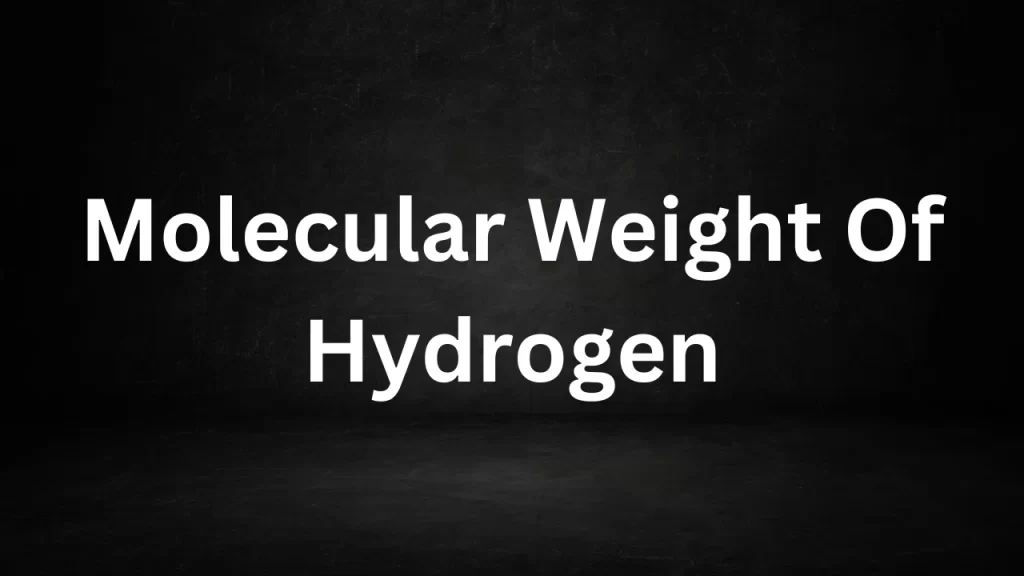Tag: Molecular Weight Of Hydrogen
Molecular Weight Of H2
Molecular Weight Of H2: Molecular weight, also known as molar mass, is a fundamental concept in chemistry that plays a crucial role in understanding the properties and behavior of substances.
In this article, we explore the molecular weight of one of the simplest molecules in the universe – H2, or molecular hydrogen. While its molecular weight is exceptionally light, its significance in the cosmos and in various scientific applications is profound.

Molecular Weight Of H2
Understanding Molecular Weight
Before delving into the molecular weight of H2, it’s essential to grasp the concept of molecular weight itself. Molecular weight represents the mass of a molecule, expressed in atomic mass units (amu) or unified atomic mass units (u). It is ascertained by summing the atomic masses of all the atoms present within a molecule. For molecular hydrogen (H2), this calculation involves adding the atomic mass of two hydrogen atoms (H).
The Composition of H2
Molecular hydrogen (H2) consists of a pair of hydrogen atoms (H). The atomic mass of hydrogen is approximately 1.008 amu. When we calculate the molecular weight of H2, we sum the atomic masses of its constituent atoms:
Molecular weight of H2 = Atomic mass of H + Atomic mass of H
The Molecular weight of H2 = 1.008 amu + 1.008 amu
Molecular weight of H2 ≈ 2.016 amu
The molecular weight of H2 is approximately 2.016 atomic mass units (amu).
Significance of H2
Molecular hydrogen (H2) may be one of the simplest molecules, but its significance extends far beyond its simplicity:
- Abundance in the Universe: Molecular hydrogen is the most abundant molecule in the universe. It plays a crucial role in the formation of stars and galaxies and is a primary component of interstellar clouds.
- Energy Source: In various scientific applications and industries, H2 serves as an energy carrier and a potential clean fuel source. Hydrogen fuel cells, for instance, use H2 as a clean and efficient source of electricity.
- Chemical Reactions: H2 is involved in numerous chemical reactions and processes, such as hydrogenation reactions in the chemical industry and the Haber-Bosch process for ammonia production in agriculture.
- Research Tool: In scientific investigations, H2 is employed in numerous experiments, including research involving nuclear magnetic resonance (NMR) spectroscopy and crystallography.
Applications of Molecular Weight
Understanding the mole weight of substances like H2 is crucial in various scientific and industrial contexts:
- Chemical Analysis: Molecular weight is used to identify and quantify substances in chemical analysis techniques like mass spectrometry.
- Dosage Calculations: In pharmaceuticals and medicine, molecular weight helps calculate the dosage of medications and ensures accurate drug formulations.
- Stoichiometry: In chemical reactions, the concept of molecular weight is essential for stoichiometric calculations, determining reactant and product quantities.
- Polymer Science: Molecular weight is central in polymer science, where it defines the size and properties of polymers.
Conclusion
The mole weight of H2, approximately 2.016 atomic mass units (amu), may be incredibly light, but its significance in the universe, scientific research, and various applications is substantial. Understanding molecular weight is not only fundamental in chemistry but also plays a pivotal role in advancing technology, energy solutions, and our understanding of the cosmos. It exemplifies how even the simplest of molecules can have a profound impact on science and the world around us.
Read More
- Molar Mass Of Methane
- Molecular Mass Of Sodium Hydroxide
- Molar Mass Of Ethyl Alcohol
- Molecular Mass Of Calcium Carbonate
- Molar Mass Of Carbon Dioxide
Frequently Asked Questions (FAQs) On Molecular Weight Of H2
1. What is the molecular weight of H2?
The mole weight of H2, or molecular hydrogen, is approximately 2.016 atomic mass units (amu) or unified atomic mass units (u). This value is obtained by adding together the atomic weights of its two hydrogen atoms (H).
2. Why is the molecular weight of H2 important?
The mole weight of H2 is important because it provides insights into the mass of a hydrogen molecule, which is the simplest molecule in the universe. It is crucial for various scientific and industrial applications, including energy research, chemistry, and dosing calculations in pharmaceuticals.
3. How do you calculate the molecular weight of H2?
The mole weight of H2 is determined by summing the atomic masses of its two hydrogen atoms. The atomic mass of hydrogen is approximately 1.008 amu (or u), so for H2, you sum 1.008 amu + 1.008 amu, resulting in a mole weight of approximately 2.016 amu.
4. What is the significance of molecular hydrogen (H2) in the universe?
Molecular hydrogen (H2) is the most abundant molecule in the universe. It plays a crucial role in the formation of stars and galaxies, and it is a primary component of interstellar clouds. Understanding H2 is essential for astrophysics and cosmology.
5. What are the applications of molecular hydrogen (H2) on Earth?
H2 serves as an energy carrier and a promising clean fuel source in diverse scientific applications and industries. It finds application in hydrogen fuel cells for efficient and environmentally friendly electricity generation. Additionally, it plays a role in various chemical reactions, including hydrogenation processes and ammonia production.
Molecular Weight Of Hydrogen
Molecular Weight Of Hydrogen: Hydrogen, the simplest and most abundant element in the universe, plays a fundamental role in the realm of chemistry and beyond.
To comprehend its properties and interactions, scientists employ various concepts, one of which is the molecular weight. In this article, we explore the molecular weight of hydrogen, shedding light on its significance and applications in the world of science.

Molecular Weight Of Hydrogen
1. Understanding Molecular Weight
Molecular weight, also known as molar mass, refers to the mass of a molecule expressed in atomic mass units (amu) or grams per mole (g/mol). It is a crucial concept in chemistry, enabling scientists to quantify the amount of a substance by mass rather than by the number of atoms or molecules, making it a valuable tool in chemical calculations.
2. The Hydrogen Molecule (H₂)
In the case of hydrogen, the molecular weight is calculated based on the diatomic molecule H₂. Each molecule consists of two hydrogen atoms (H), and the atomic weight of hydrogen is approximately 1.008 amu. To determine the molecular weight of H₂, we add the atomic weights of its constituent atoms:
Molecular Weight of H₂ = 2 × Atomic Weight of Hydrogen ≈ 2.016 g/mol
Therefore, the molecular weight of hydrogen gas (H₂) is approximately 2.016 grams per mole (g/mol).
3. The Significance of Hydrogen’s Low Molecular Weight
Hydrogen’s exceptionally low molecular weight is one of its defining characteristics. It is not only the lightest element but also the lightest molecule. This low molecular weight contributes to several remarkable properties and applications:
- Efficient Fuel: Hydrogen’s low molecular weight makes it an excellent fuel source for rockets and combustion engines. Its combustion produces a high amount of energy per unit mass, making it an ideal choice for space exploration and fuel cells.
- Buoyant Gas: Hydrogen is lighter than air, which makes it an efficient lifting gas. In the early days of aviation, hydrogen-filled airships (such as the Hindenburg) were used for transportation, although its flammability posed significant safety concerns.
- Chemical Reactivity: Due to its low molecular weight, hydrogen gas exhibits high chemical reactivity. It readily reacts with various elements, including oxygen, forming water (H₂O) in combustion reactions.
4. Hydrogen Isotope Variants
It’s essential to note that hydrogen has three isotopes, each with different atomic weights: protium (¹H), deuterium (²H or D), and tritium (³H or T). Protium is the most common and abundant isotope, making up approximately 99.98% of naturally occurring hydrogen. Deuterium is a stable isotope, while tritium is radioactive.
- The molecular weight of hydrogen gas (H₂) primarily accounts for the protium isotope. Deuterium, which is twice as heavy as protium, results in a slightly higher molecular weight when present in hydrogen molecules.
5. Applications Beyond Chemistry
The mol weight of hydrogen extends its importance beyond the realm of chemistry:
- Energy Production: Hydrogen holds promise as a clean and sustainable energy carrier. It can be used in fuel cells to generate electricity, producing water as the only byproduct.
- Space Exploration: Hydrogen is a critical component of rocket fuels used in space exploration due to its high energy content and low molecular weight.
- Alternative Fuel: In the context of addressing environmental concerns, hydrogen is being explored as a potential alternative to fossil fuels in transportation and industry.
6. Conclusion
The mol weight of hydrogen, approximately 2.016 g/mol, is a fundamental property that characterizes this element’s diatomic molecule, H₂. Its lightweight nature contributes to its versatile applications in energy production, space exploration, and emerging technologies aimed at a sustainable future. Understanding the mol weight of hydrogen is essential for harnessing its potential as an efficient and clean energy source and for advancing our understanding of the universe at its most basic level.
Read More
- Molecular Weight Of Hydrogen
- Molecular Weight Of Urea
- Molecular Mass Of Urea
- Molecular Mass Of Hydrogen
- Molecular Mass Of Nacl
Frequently Asked Questions (FAQs) Molecular Weight Of Hydrogen
1. What is the molecular weight of hydrogen?
The mol weight of hydrogen is approximately 2.016 grams per mole (g/mol). This value represents the mass of one mole of hydrogen molecules (H₂), with each molecule consisting of two hydrogen atoms.
2. How is the molecular weight of hydrogen calculated?
The mol weight of hydrogen is calculated by adding the atomic weights of its constituent atoms. The atomic weight of hydrogen is approximately 1.008 amu (atomic mass units). Since one molecule of hydrogen (H₂) contains two hydrogen atoms, you sum the atomic weights as follows: 1.008 amu + 1.008 amu ≈ 2.016 g/mol.
3. Why is hydrogen’s molecular weight important in chemistry?
Hydrogen’s low mol weight is significant because it affects its physical and chemical properties. It makes hydrogen an efficient fuel, a buoyant gas, and a highly reactive element in various chemical reactions. Understanding its molecular weight is crucial for applications in energy, space exploration, and chemistry.
4. How does hydrogen’s molecular weight compare to other elements?
Hydrogen has the lowest molecular weight of all elements. This low mass makes it exceptionally lightweight and has practical implications, such as its use in hydrogen fuel cells and its historical use in airships.
5. Is the molecular weight of hydrogen affected by its isotopes?
Yes, the mol weight of hydrogen can be affected by its isotopes. Hydrogen has three isotopes: protium (¹H), deuterium (²H or D), and tritium (³H or T). While the mol weight primarily considers the protium isotope, the presence of deuterium in hydrogen molecules (known as heavy hydrogen) can slightly increase the mol weight due to its higher atomic weight.